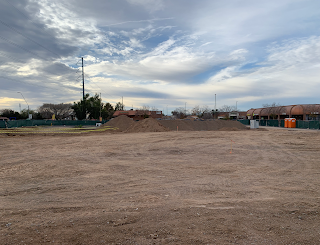Understanding the women who raised the Baby Boomers
If you've heard the expression "Boomer", relating to an elderly person, like me, it means the generation of babies born right after World War II. From what I've read, you're considered a "Boomer" even if you were born in 1965, but that seems too much of a stretch for me. Even I'm not quite in the category of people born right after World War II, being born in 1958, over ten years after the end of the war, but my parents were very much of the generation that raised Baby Boomers.
My mom was born in 1926, so she would have been only 15 years old when America entered the war (that's not her in the pic up there), but she was at getting close to the right age to begin a family when it ended. She was in high school, and she always told me that she vey much wanted to have children, which she did (including me!).
The women that my mom saw around her during World War II were very much like the poster of "Rosie the Riveter", capable, hard-working, putting in long hours on tough jobs, and many of them also served in the military. These women were doing things that their grandmothers only dreamed of, they were voting, they were being treated with respect in the workplace. They were in a league of their own.
But things changed quickly after the war. Women stepped aside when their men returned home. They downed tools, and put on aprons. They left factories, and stayed at home, in the kitchen. Well, not all of them, but that was considered the feminine ideal, and it's what my mom did, with pride.
My mom was exceptionally intelligent. She was the smartest girl in school, probably the smartest kid overall. She went to college, which she did with ease. My dad may have given me my good looks, but my brains came from my mom. And I recall that this puzzled me as a kid, and I once asked her if just being a housewife was enough for her? This was during the early the 1970s, the era of "Women's Lib" (Women's Liberation), when women were striving to cast off limitations that held them back from opportunities, like jobs, and education. But my mom defended her lifestyle.
I remember what she told me. To her, all that mattered was raising sons. She had four of them, no daughters. She told me that her intelligence and education was dedicated to raising the next generation of men. Every once in a while she would bemoan not having a daughter that she could dress up, but mostly she saw her mission in life to be the raising of boys, which she did.
My mom and dad were very much the people who saw a clear future, with strong and honorable men, after World War II. And yes, I mean men as in males. Females were to play a supporting role, that's all.
To my surprise, I see this "male-centric" world view continue. People who ask me about my genealogy assume that I only trace the Hall side, that is, the male side. It has genuinely puzzled people, even young people, that I would have an equal interest on the maternal side.
When I began my corporate career, in the 1980s, I was surrounded by women. I've had several female bosses, and lots of female co-workers. I took this female intelligence and initiative for granted, but I know that a lot of people, including the women themselves, didn't. Sometimes I would ask this, and you'd be surprised how many people couldn't answer it:
A boy goes to the hospital, and the doctor says, "I can't operate on him, he's my son!" How is this possible?
The doctor is a woman.
Thank you for helping me to understand the women who raised the Baby Boomers.




Comments
Post a Comment